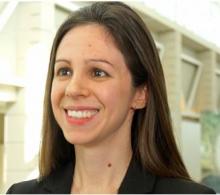However, the numbers that guide treatment for hypothyroidism are different. “We use a cutoff, generally, of 4 or 5, but maybe that cutoff should be 2.5, and maybe that’s significant for some people,” Dr. Fourman said.
“Current guidelines do not recommend treatment of subclinical hypothyroidism among auto-antibody negative women attempting to conceive naturally,” wrote Dr. Fourman and her collaborators in the poster presenting their finding.
Twice as many women in the group with unexplained infertility had TSH levels in the upper half of the normal range – above 2.5 mIU/mL – than in the male factor infertility group, “again, suggesting this association with TSH and unexplained infertility,” Dr. Fourman said. The thyroid axis is known to play a role in oocyte development. Of women with unexplained infertility, 26.9% had a TSH above 5 mIU/mL, compared with 13.5% of those with severe male factor infertility (P less than .05).
The chart review of records from 187 women with unexplained fertility and 52 women whose partners had severe male factor infertility included women aged 18-39. The unexplained cohort included women for whom all causes of infertility were excluded “in the setting of a very thorough workup – and that would include any ovulatory issues, male factor issues, and by definition, these women had to have a normal FSH, TSH and prolactin,” said Dr. Fourman, an endocrine fellow at Massachusetts General Hospital, Boston.


